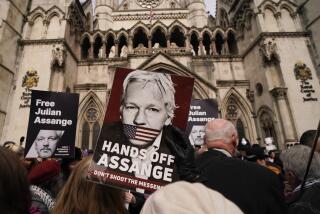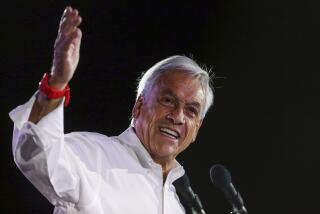Pinochet Is Freed by Britain, Flies Home to Chile
- Share via
SANTIAGO, Chile — Gen. Augusto Pinochet’s epic battle to avoid prosecution in foreign courts came to an end Thursday when the enfeebled former Chilean dictator flew home to a country fortified by his 17-month absence.
Still powerful when he traveled to London in the fall of 1998 as a VIP hosted by former British Prime Minister Margaret Thatcher, the 84-year-old Pinochet returned to Chile a diminished figure deemed too muddled to stand trial for alleged human rights crimes.
The onetime strongman who ousted Socialist President Salvador Allende in a bloody coup more than a quarter-century ago came home from house arrest in England just days before the inauguration of another Socialist president, whose election was seen as a major advance in the country’s recovery from Pinochet’s 1973-90 military regime.
In the interim, Pinochet unwittingly served the interests of international human rights law. His case set a precedent for stripping former heads of state of diplomatic immunity for crimes against humanity, serving notice to despots of all political stripes that they cannot commit abuses at home and expect to travel freely abroad.
Pinochet’s journey home began early Thursday when British Home Secretary Jack Straw announced that he was denying a Spanish extradition request to try the general on human rights charges. Straw said he had accepted the findings of a panel of eminent British doctors that a series of strokes last year had left Pinochet unable to understand or contribute to complex legal proceedings and that he was, therefore, unfit to stand trial.
Pinochet was expected to arrive at an airport in the northern Chilean town of Iquique. He flew home aboard a Chilean 707 jet that had been converted into an airborne ambulance with a 17-member crew that included a team of medical specialists.
Accompanied by his physician, wife and a grandson, the former dictator was expected to rest a few hours and fly to Santiago early this morning for a brief airport reception by military brass. Then he will be taken to a military hospital, where he reportedly will spend several days--and where he is expected to be cheered by supporters.
But the chilly reception awaiting Pinochet from most politicians, the courts and an increasingly indifferent public demonstrates that much has changed during his forced exile. Many Chileans see Pinochet as a physically and politically broken man likely to fade from public life.
“Pinochet was the figure who spread terror in this society,” said Hugo Gutierrez, a lawyer for victims of the military regime. “He was untouchable. Well, now it’s been shown the guy can be touched. He is not the same arrogant figure. He has been humiliated and condemned internationally.”
Gutierrez and other human rights lawyers went to court Thursday to seek Pinochet’s ouster from the Senate. Stripping the parliamentary immunity of the self-appointed senator for life would be the first step in an uphill battle to try him in Chilean courts in a 60-count case of dictatorship-era atrocities being investigated by a special prosecutor.
His removal from the Senate would have to be approved by appellate courts, which traditionally are conservative. There was talk in Santiago that, after President-elect Ricardo Lagos takes office March 11, Congress is expected to approve a law that would enable Pinochet to resign from the Senate while retaining immunity.
Critics doubt that Chilean democracy is strong enough to withstand a trial, but special investigative magistrate Juan Guzman insists that he wants to perform tests to see if Pinochet is psychologically fit to be tried.
On the political front, leaders of the center-left government who fought for the release of their nemesis, asserting that his arrest violated national sovereignty, expressed satisfaction but little sympathy.
Foreign Minister Juan Valdes declared that Pinochet’s ordeal was his own fault. And President Eduardo Frei, who had pledged to bring about Pinochet’s return before leaving office, said: “No Chilean can be above the rule of law and justice. It will be the Chilean courts, without any other intervention, that decide whether Sen. Pinochet is responsible for the crimes of which he is accused.”
And Chile’s two right-wing parties kept their distance from Pinochet, continuing a significant policy shift in which prominent rightist leaders have gone so far as to say that he must face justice here. The parties were avoiding an official role in today’s welcoming ceremonies, leaving it up to members to attend on their own.
The governments of Spain, Belgium, France and Switzerland, which all sought Pinochet’s extradition, had asked for further medical tests for the ex-strongman, but Britain’s Straw rejected their requests Thursday and said the general was free to leave on the jet that had been waiting in Britain for weeks.
Spanish magistrate Baltasar Garzon, whose 1998 arrest warrant triggered the extradition case, made a last attempt at blocking Pinochet’s release. He argued that he had a right to appeal Straw’s decision on the grounds that the case was still before British courts.
But the British government rejected his claim, and the conservative Spanish government, which never shared Garzon’s enthusiasm for trying Pinochet, accepted Straw’s decision, as did Belgium and Switzerland. France protested, but it also took no legal steps to stop the release.
Throughout the morning, protesters shouting “Assassin!” held vigil in front of the estate west of London where Pinochet had been under house arrest. But Pinochet’s bodyguards, initiating a secret plan by the Chilean military dubbed “Operation Return,” hustled him out a side entrance and deprived demonstrators of one last look at the man they accused of sneaking out “like a bandit.”
The police-escorted caravan speeded to a British military base, and the Chilean jet took off on a secret flight path expected to require a refueling stop.
As soon as Pinochet was in the air, Straw appeared before Britain’s House of Commons to explain his decision. He acknowledged that Pinochet “will probably not be tried anywhere” but said the ex-dictator’s medical condition had left him no alternative.
“Ultimately, I was driven to the conclusion that a trial of the charges against Sen. Pinochet, however desirable, was simply no longer possible,” Straw said.
Nonetheless, Straw added, the case “has established, beyond question, the principle that those who commit human rights abuses in one country cannot assume that they are safe elsewhere. That will be the lasting legacy of this case.”
Conservative leader William Hague accused the government of having wasted millions on “the Pinochet fiasco--a story of moral posturing, gross incompetence and now international humiliation.”
Human rights activists expressed disappointment but concurred that the case served a valuable purpose in asserting international jurisdiction over crimes against humanity.
“It is important to remember all of the victories along the way,” said Reed Brody of the New York-based group Human Rights Watch. He pointed to “the very fact that Pinochet was arrested, that four countries sought his extradition, that his claim of immunity was rejected, that his [alleged] crimes were spelled out before British courts. The world is becoming a smaller place for people who commit atrocities.”
Pinochet’s detention in Britain--and revelations of his precarious mental state--deflated his aura in Chile and helped speed the democratic transition here, said political scientist Ricardo Israel. Pinochet’s return has caused a flurry of interest, but Israel predicted that most Chileans will get on with their lives because the elderly general no longer inspires profound passion or fear.
* Miller reported from London and Rotella from Santiago. Times staff writer Richard Boudreaux in Madrid contributed to this report.
More to Read
Sign up for Essential California
The most important California stories and recommendations in your inbox every morning.
You may occasionally receive promotional content from the Los Angeles Times.










